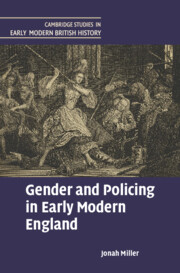Book contents
- Gender and Policing in Early Modern England
- Cambridge Studies in Early Modern British History
- Gender and Policing in Early Modern England
- Copyright page
- Dedication
- Contents
- Tables
- Acknowledgements
- Abbreviations and Conventions
- Introduction
- Part I Patriarchy
- Part II Remaking Office
- 2 The Law of Office
- 3 Office and Manhood
- Part III Policing
- Conclusion
- Book part
- Select Bibliography
- Index
3 - Office and Manhood
from Part II - Remaking Office
Published online by Cambridge University Press: 07 June 2023
- Gender and Policing in Early Modern England
- Cambridge Studies in Early Modern British History
- Gender and Policing in Early Modern England
- Copyright page
- Dedication
- Contents
- Tables
- Acknowledgements
- Abbreviations and Conventions
- Introduction
- Part I Patriarchy
- Part II Remaking Office
- 2 The Law of Office
- 3 Office and Manhood
- Part III Policing
- Conclusion
- Book part
- Select Bibliography
- Index
Summary
This chapter traces the emergence of a new kind of official masculinity which was not rooted in the household. In the mid-seventeenth century, some lawyers attempted unsuccessfully to exclude women from officeholding entirely by arguing that gender trumped householder status as a qualification for office. Also in the mid-seventeenth century, the new system of indirect excise taxation produced a new kind of officer: young, unmarried, and always male. Excisemen were derided for lacking the independence of traditional householder officers and their wives (if they did marry) were prohibited from taking part in official business. This complete separation of office and household began to be mirrored by London constables and watchmen in the later seventeenth and early eighteenth centuries. Householders chosen to hold these offices increasingly hired deputies to serve for them, and deputies tended to be poorer than their principals. Many were either younger or older than middle-age and often unmarried. In the course of working and socialising together year after year, these deputies developed a culture of fraternal masculinity based on solidarity, drinking, misogyny, and violence.
Keywords
- Type
- Chapter
- Information
- Gender and Policing in Early Modern England , pp. 103 - 134Publisher: Cambridge University PressPrint publication year: 2023

